Can You Get in Trouble for Writing a Bad Review

If you lot've always ordered your morning coffee and felt bromidic past the request to participate in an online survey or leave a social review regarding your feel, you probably didn't have a specially noteworthy experience.
If you're willing to take time out of your day to get out online feedback, it's usually because you lot want to warn people about a bad come across, or to help them make a ameliorate ownership decision.
In a world of viral marketing and social influence, online reviews take the ability to brand or suspension pocket-size businesses, just they aren't the only companies paying attention. Reviews have get such a pivotal function of the buying experience for then many customers, that even tech goliaths like Apple can't assist but play an agile role in responding to more critical responses.
And then what compels u.s. to get out reviews online, and what are nosotros actually hoping to accomplish by contributing to the public discussion of a brand, experience, or product? To find out, we surveyed over 1,000 European and North-American consumers near why they leave bad reviews, how proficient experiences inspire them to give feedback, and the kinds of reactions and rewards they sometimes wait to receive as a result of their critiques.
Recollect the online review phenomena might sometimes have ulterior motives? Read on to see what we uncovered.
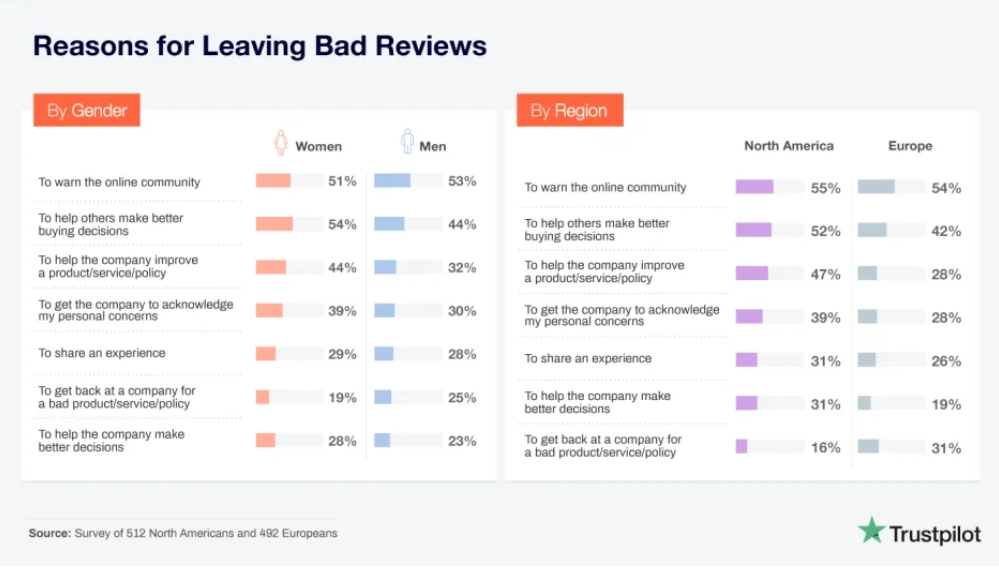
Research indicates overall client satisfaction with in-store shopping continues to increase, but so do consumers' expectations almost what a good shopping feel looks like in the first place. Consumers want retailers to have meliorate applied science, offer more services, and establish amend personal connections.
So what happens when the product or purchase doesn't quite alive up to its expectations?
You might consider leaving a negative review.
While the occasional bad mark can be practiced for helping customers build trust with a make, too many can be a articulate indication that something's gone seriously wrong.
Overwhelmingly, more than than one-half of both women and men admitted they go out negative comments nigh businesses simply as a warning to the online community. Other reasons included helping found proper expectations and to steer buyers away from making a purchase they'll subsequently regret. Women were most likely (54 per centum) to report doing it to help other people make amend buying decisions. While some wanted to assist companies improve their services and others wanted to share their overall experience, very few seemed to have malicious intent. Less than 1 in 5 women and 1 in 4 men shared negative feedback to get back at a company for a bad policy or product.
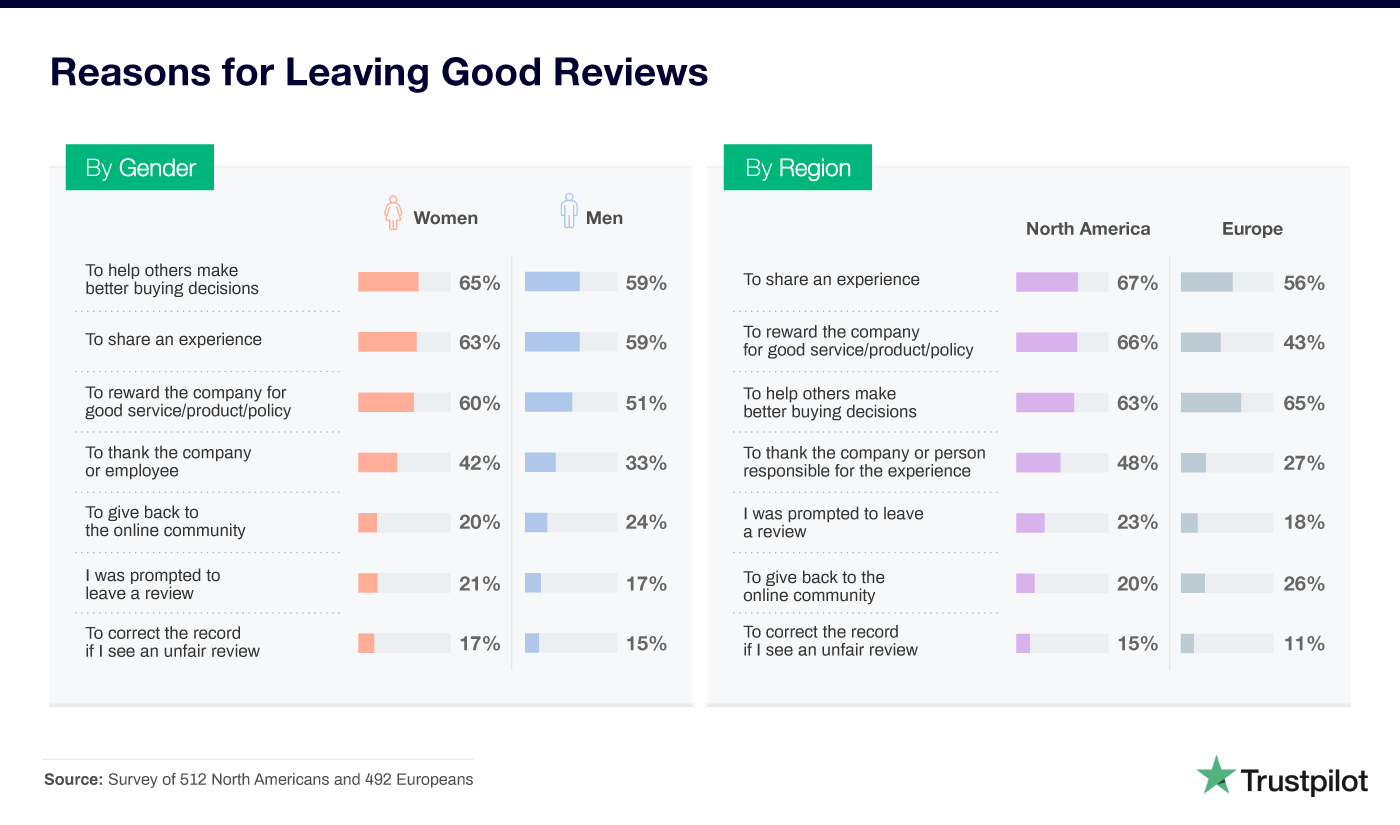
A business organisation doesn't have to take exclusively glowing reviews in guild to help compel people to buy its products or frequent its store. Skillful or bad, a vast majority of customers will leave businesses a review when prompted, and nigh consumers have the same calendar for their positive comments equally their negative reviews: helping other people make amend purchases.
Amongst women, helping other people make improve ownership decisions was the leading reason for spending fourth dimension writing a positive review for a product or service, while men were tied for both meliorate buying know-how and simply exercising the opportunity to share their experiences overall.
Both men and women were sometimes compelled by the opportunity to advantage companies or employees for skilful service, and others simply wanted to give back to their online communities.
Notwithstanding, online review etiquette may non entirely translate across borders. North-American consumers were almost twice every bit likely to use the ability of their positive feedback as an opportunity to thank a specific staff member for their efforts.
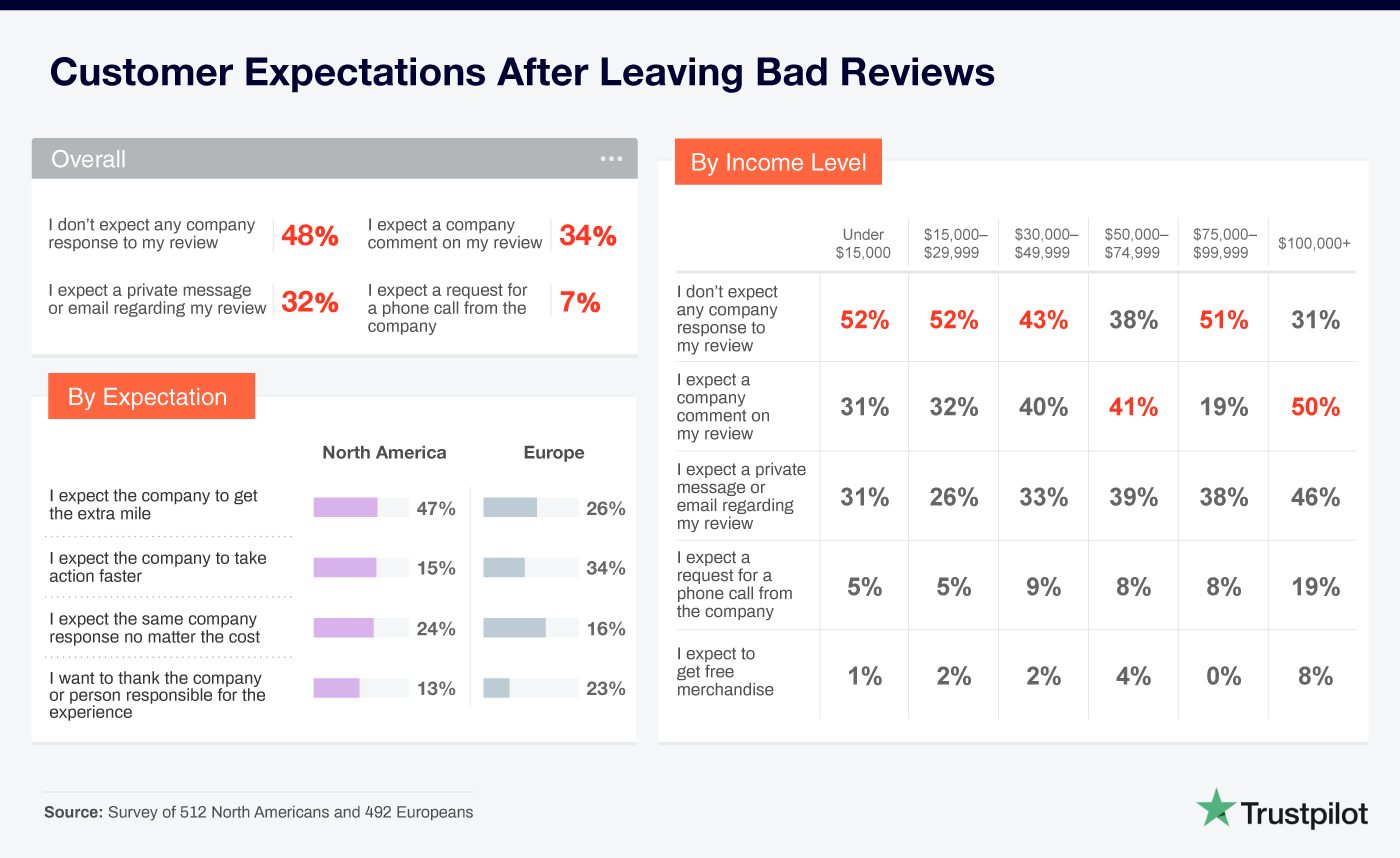
Standard customer service lawmaking dictates a simple truth most businesses endeavor to live by: The customer is always right. Even if the boilerplate employee doesn't always hold, information technology'due south a common adage that's been designed to remind brands to keep the client – and their grievances – in proper perspective. But does that sometimes embolden consumers to look more than than they're entitled to?
While a majority of people who've made the effort to leave a bad review for a company or their services generally don't expect a response to their comments, roughly 1 in 3 expected either a company annotate or individual bulletin. In some cases, people may fifty-fifty be expecting compensation in the class of merchandise or credit to help make upward for their poor experience. Less common overall, we found it was consumers with the highest almanac income who felt the most entitled to free trade in response to their negative feedback.
Among North-American consumers, this sentiment was especially strong when asked about expensive purchases. Near half admitted they envisioned companies wanting to become the "extra mile" to correct their bad experiences. But 1 in four Europeans had the aforementioned perspective in contrast.
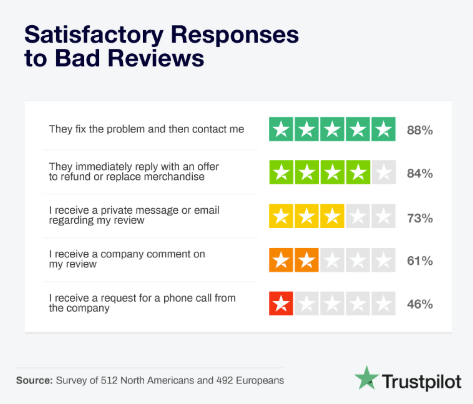
With and so many people expecting to receive personalised responses to their negative reviews, it's fair to wonder how they desire those conversations to exist handled. There are enough of examples for concern owners on the best means to address public criticism, and most experts recommend refraining from defensive comments and focusing on finding a way to fix the client'due south concerns.
In general, that'due south exactly the kind of response well-nigh consumers are looking for. A vast majority – 88 percent – of people voted for companies to prepare the issue at hand and and then contact them regarding the solution. Slightly fewer (84 percent) expected an firsthand response with the offer to refund or replace the production in question.
Still, for some consumers, a simple answer would suffice equally a response to their negative feedback. Most three in 4 would be happy with a private message or email, and 61 pct expected a company to publicly comment on their review.
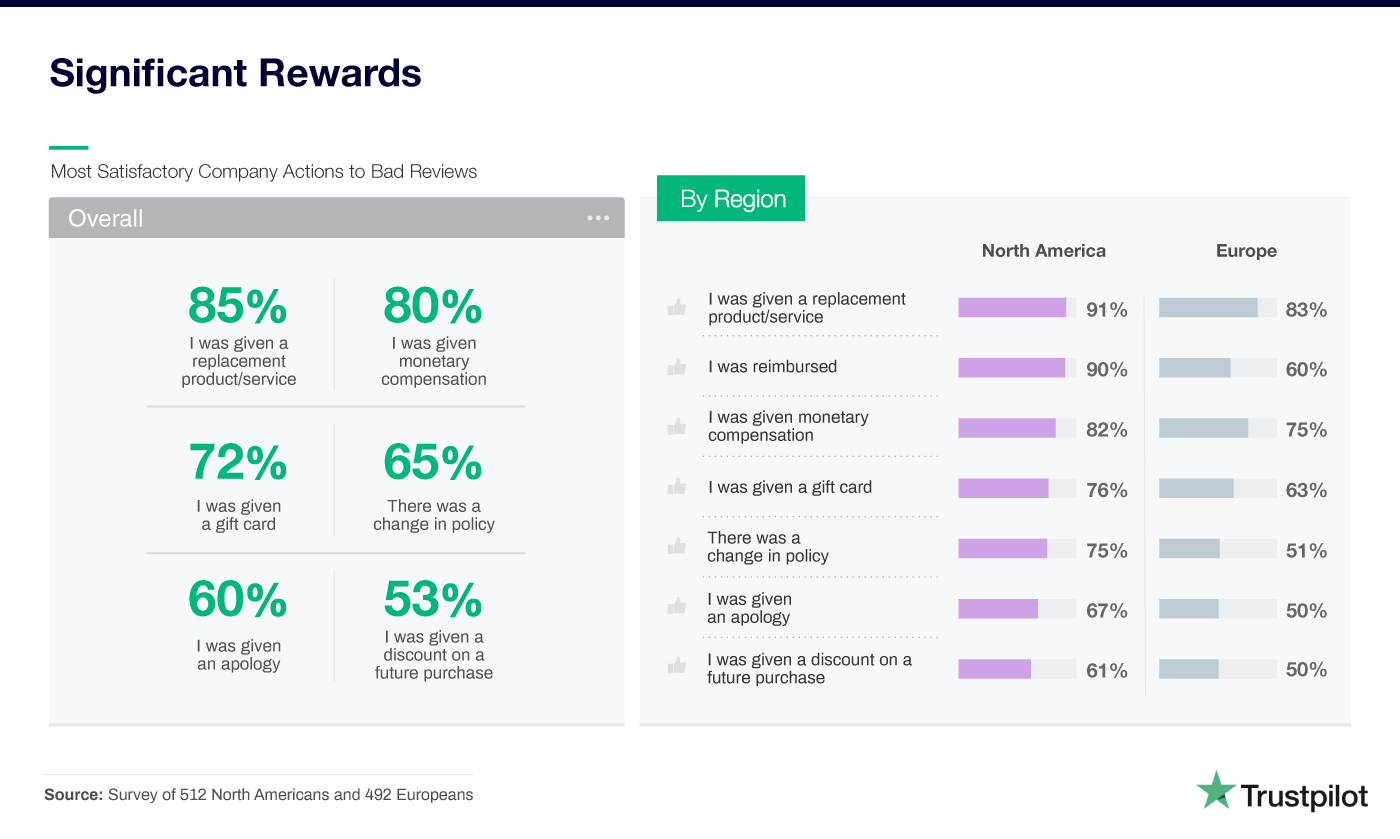
Depending on how bad an interaction is or how poorly a product performs, in some cases, a reply from the company regarding a negative online review just isn't sufficient to resolve the event. Occasionally, consumers look to exist compensated monetarily to help make upwardly for the perceived offense.
Overall, 85 percent of people believed a replacement of the product or service would be in order post-obit a negative review, and lxxx percent would prefer being given monetary compensation for their time and inconvenience. While others wanted a reimbursement for their purchases or a souvenir card to aid make upward for the experience, nearly 2 in three wanted companies to get even further by instituting policy changes storewide to help resolve their concerns.
Regardless of the extent of their requests, from replacement on faulty products to discounts on future purchases, we found North-American consumers were more inclined to look these kinds of rewards for their negative reviews than European shoppers.
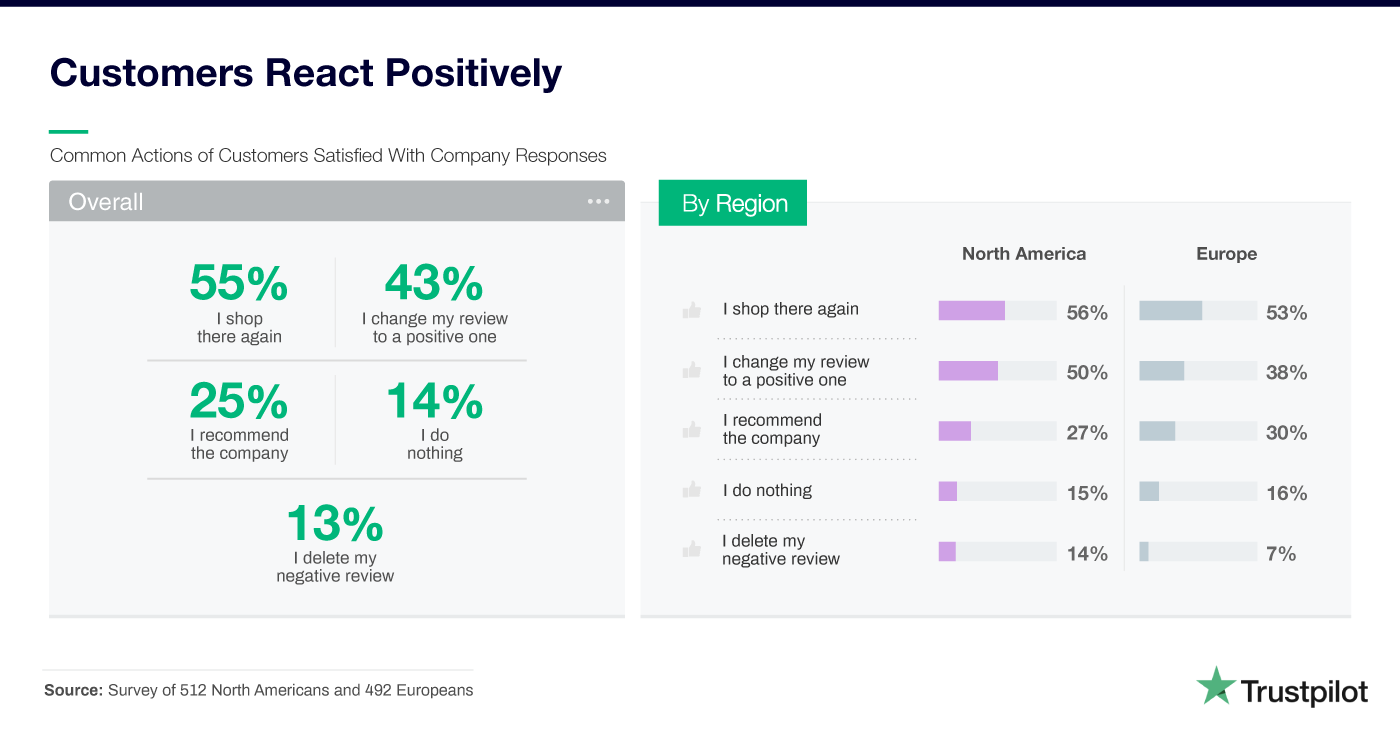
Customers may take high expectations for what they expect from their in-store shopping experiences and even higher expectations for how companies should respond (including how rapidly) when something's gone wrong enough to warrant a negative online review. And how many customers feel their concerns have been handled poorly can have a long-term effect on their relationship with that brand.
When customers feel their reviews have been responded to appropriately, more than half admitted to shopping at the same location again. More than 2 in 5 customers would even go so far as to reverse their overall rating of the company and edit their review into a more positive critique. For 25 percent of people, how well companies reply to criticism can fifty-fifty help transition them from detractors to overall promoters of that company.
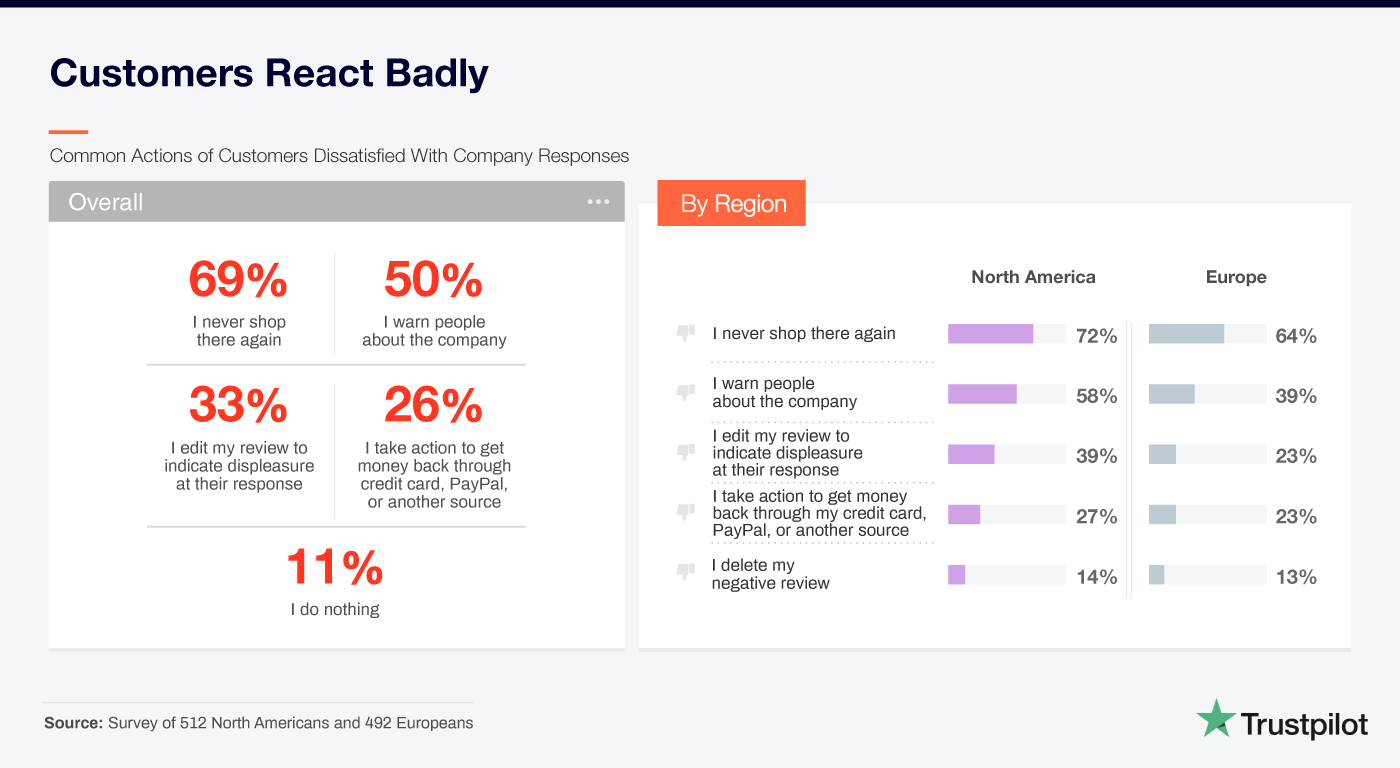
In dissimilarity, failing to reply appropriately sometimes emboldens customers to take further action against a company. More than 2 in iii people who were unsatisfied with a company response to their feedback admitted they wouldn't shop with that establishment again, and half would warn others to stay away from the visitor too. And if they really believed a refund was in order, 1 in iv would go through their credit bill of fare company to contest the original accuse themselves.
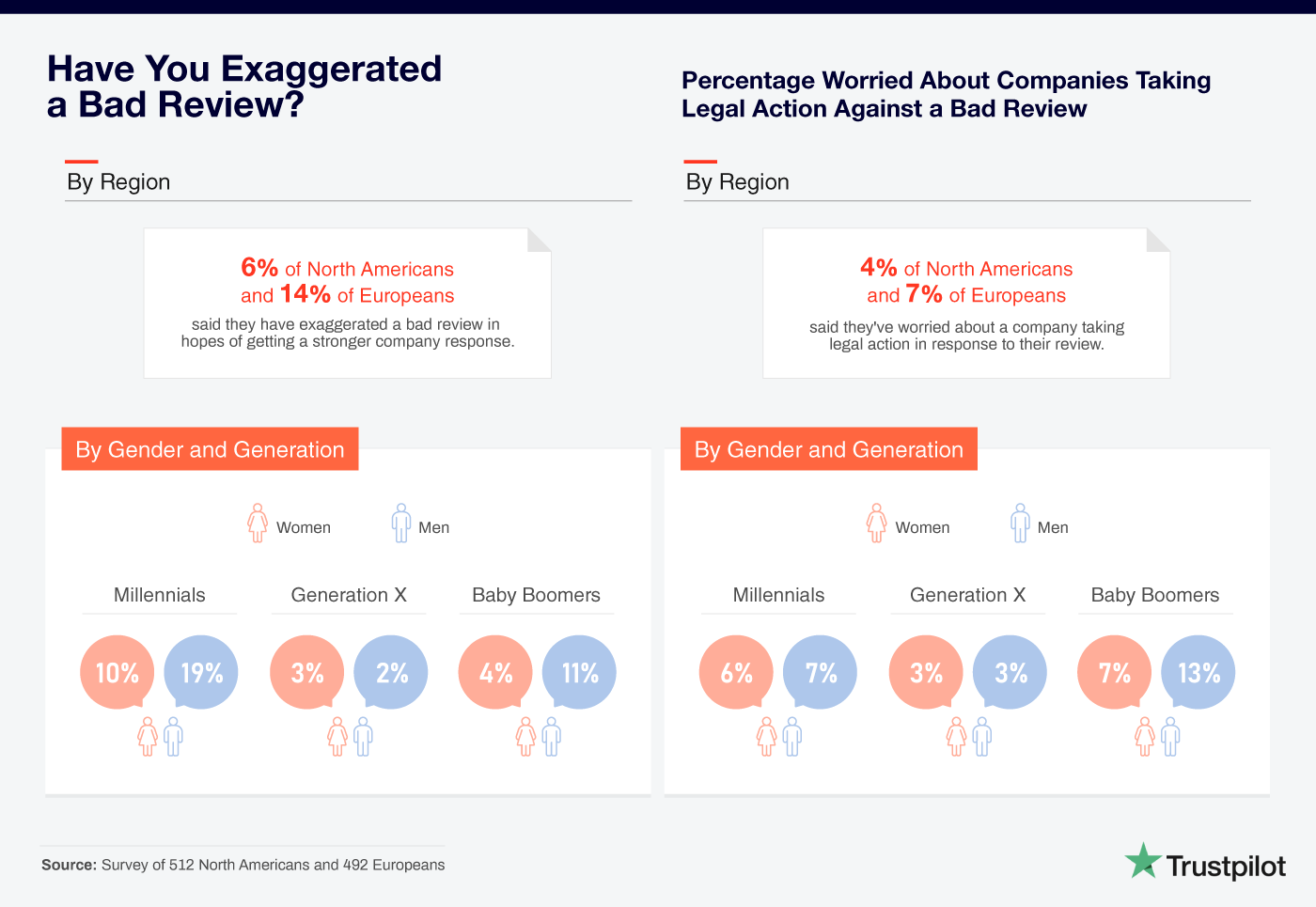
Some may call information technology a white prevarication, others may call it a fisherman's tale, but don't be surprised that there is some exaggeration in online reviews past consumers. They're hoping to elicit a stronger response from the visitor, and it's Europeans more than and then than Americans who use this practice.
Across gender and generational groups, it is typically men who find ways to aggrandize upon the truth to garner a response. This can be dangerous, withal, as some companies and small businesses accept started fighting back confronting negative online reviews.
One adult female in New York plant herself beingness sued past her doctor for roughly $1 one thousand thousand after leaving a review that called the business concern "very poor and crooked." This is non the only instance of companies firing back at negative criticism online – more than ever, businesses are defending their reputations and are willing to go to court to protect their brand.
As the face up of retail continues to evolve and customer service stands front and eye for about brands as a key distinguishing feature between them and their competitors, the average consumer has higher expectations today of what they expect from their shopping experiences and the goods and services they purchase. Nowhere is that more evident than the phenomena that are online reviews. For both good experiences and bad, customers aren't just leaving feedback for the company to see, they expect a response (and sometimes retribution) for their concerns.
At Trustpilot, we know every review has a personal story, and backside that review is an experience that matters. By sharing experiences that help build trust in the community, we help customers buy with confidence and assist companies apply their online reviews to their advantage. Through shared reviews and experiences, customers can observe the very best in everything from pet care to their own health and wellness. At Trustpilot, nosotros help you build trust and ameliorate your visitor's reputation among current and potential customers.
Find out more near Trustpilot, request a demo below.
Request a free Trustpilot demo
Source: https://business.trustpilot.com/guides-reports/learn-from-customers/bad-reviews-why-people-write-them-and-what-they-expect